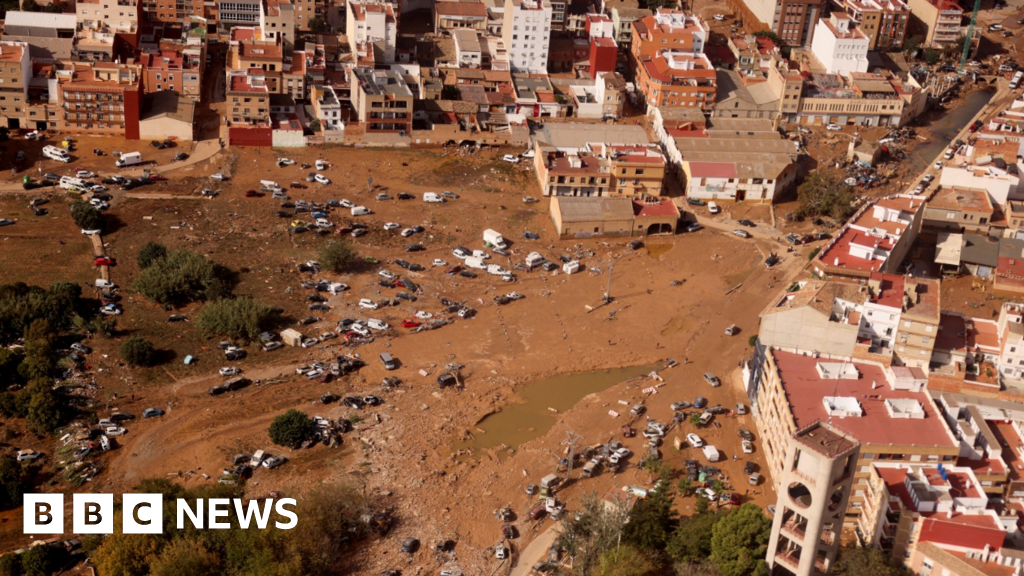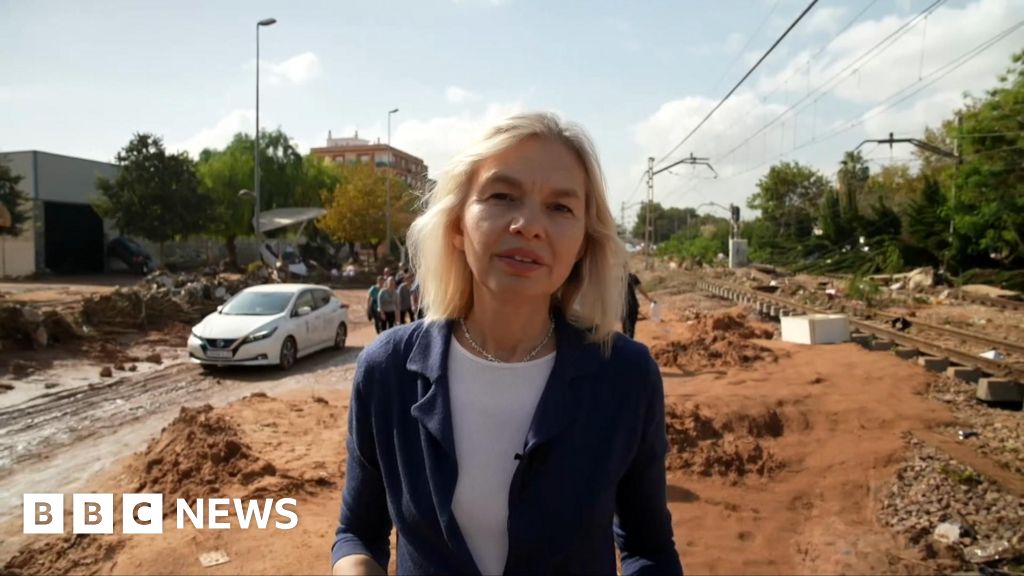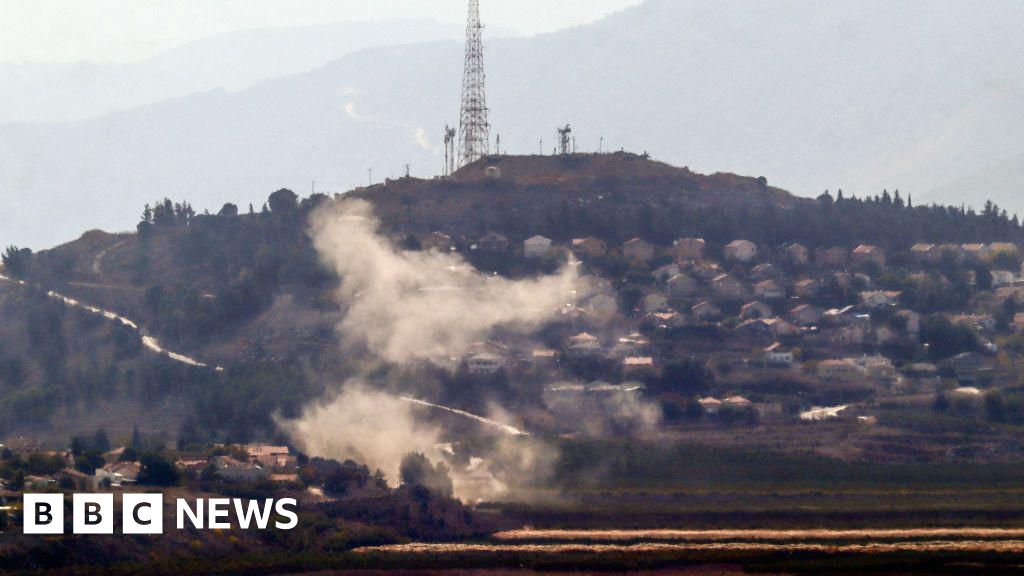ARTICLE AD BOX
Watch: 'It started raining pinecones and tree bark.'
An official deadline to evacuate Yellowknife as a wildfire looms on its outskirts has lapsed, as residents scramble to leave by air and road.
About 22,000 people - or roughly half the population in Canada's Northwest Territories - are now displaced in the country's worst fire season on record.
A separate blaze in the west, that threatens Kelowna, British Columbia, has grown one hundredfold in 24 hours.
Officials have warned the fires "are very active and very unpredictable".
"The stress of leaving your home not knowing if it will be there when you return is now a reality faced by thousands," Harjit Sajjan, Canada's minister of emergency preparedness, said at a news conference on Friday.
He said the federal government did not yet know the full extent of the damage wrought in what has been an "incredibly challenging week for Canadians".
The McDougall Creek Wildfire, in Kelowna, in the western province of British Columbia, poses a particularly concerning threat to lives and properties after it grew significantly overnight.
The BC Wildfire Service said the fire, which had been mapped at 1,100 hectares early on Thursday evening, was now estimated at 6,800 hectares.
Image source, Getty Images
Image caption,One Kelowna resident told the BBC the fires came over the mountainside like an 'ominous cloud of destruction'
"The winds were very concerning and we didn't know where things are going," Mr Sarjjan told reporters.
Local BC officials declared a state of emergency on Friday morning. More than 2,400 people have since been evacuated, with thousands more on alert to leave on short notice.
The fast-moving fire is bearing down on a city with a population of about 150,000 people, and officials are already reporting "significant structural loss", including in Trader's Cove in the Okanagan Valley.
"We fought hard last night to protect our community," West Kelowna fire chief Jason Brolund said at a news conference.
He said the actions taken to rescue members of the public and save homes in the area had been akin to "a hundred years of firefighting all at once in one night".
No deaths have yet been reported, but Mr Brolund said the fire remains "dynamic" and "as significant today as it was last night", a preview of what may come in the days ahead.
Juliana Loewen, a Kelowna resident who is not currently under evacuation orders, is huddling with more than a dozen other people at her home on Okanagan Lake as they await updates.
She told the BBC how locals had watched a plume of smoke coming over the mountainside like an "ominous cloud of destruction" and how some on the Trader's Cove side jumped into the lake as the fire spread and exit routes were blocked.
Her brother and grandmother evacuated and came to her house after "the fire jumped very quickly from one tree to an entire area, threatening an entire residential community".
Roads are jammed up, businesses have shut down and neighbours are on their lawns tossing valuables into their vehicles. "It's very apocalyptic," she said.
Residents are used to the fires because of Kelowna's "California-style climate" but the heat, dryness and wind seen in recent days had created the "perfect conditions for a firestorm", Ms Loewen added.
The airspace around Kelowna International Airport has now been closed to everything other than aerial fire-fighters.
Some 2,000km (1,240 miles) northeast, winds blowing in the Northwest Territories on Friday and Saturday could push the blaze outside Yellowknife closer toward the city and one of its highways, the Ingraham Trail.
Successful firefighting efforts have made meaningful progress in holding back the fire over the last two days, and it remains about 15 km (9 miles) northwest from the city's municipal boundary.
Air tankers are flying missions day and night in an effort to further slow the fire.
The Canadian government has said enough pilots will be made available to man the evacuation flights leaving the city.
Amid accusations that some airlines are inflating prices for evacuation flights, officials have warned there will be zero tolerance on price gauging.
Some essential workers have yet to evacuate the city. Among them is Dr Lori Regenstreif, usually based out of Ontario but who has been working in the Northwest Territories over the last week.
She said it has been surreal watching the territory's capital city go from being a hub for wildfire evacuees from other parts of the Northwest Territories earlier this week to being under its own state of emergency.
"Yellowknife is the go-to. Now Yellowknife is vulnerable," said Dr Regenstreif. "It's like their mothership has gone down."
The streets have been left deserted, and restaurants and businesses have shuttered their doors.
Watch the treacherous journeys out of wildfire-hit Canada
Patients continue to be airlifted out of hospitals as of Friday. Some of the wards are so empty, according to the doctor, that staff have been sleeping in them overnight as they wait their turn to leave.
Those who remain in the city are mostly firefighters, police officers, doctors and nurses. One pharmacy in town remains open, Dr Regenstreif said, as its owner refuses to close it.
She has also noticed a handful of others who remain in the city. "I can't really speculate on why," she said, adding: "If my home were up here, I probably wouldn't want to go either."
As the weekend nears, the smoke in the air has cleared up, but there is a sense of unease as the wildfire continues to burn nearby.
"There's this calm before the storm," said Dr Regenstreif. "It is a bit nerve-wracking that you know something's going to come, but you don't see any of it now."
Nearly 1,100 active fires are burning across the country.
Experts have pointed to a warmer and drier spring than normal as the reason.
Scientists say climate change increases the risk of the hot, dry weather that is likely to fuel wildfires.
Additional reporting by Nadine Yousif in Toronto

 1 year ago
19
1 year ago
19








 English (US)
English (US)